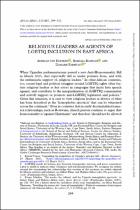| dc.description.abstract | When Ugandan parliamentarians passed a new Anti-Homosexuality Bill in March 2023, they reportedly did so under pressure from, and with the enthusiastic support of, religious leaders.1 In other African countries, too, recent legal and political struggles around LGBTIQ rights often feature religious leaders as key actors in campaigns that incite hate speech against, and contribute to the marginalization of, LGBTIQ communities and actively support or promote anti-LGBTIQ legislation and policies.2 Given this situation, it is easy to view religious leaders as drivers of what has been described as the ‘homophobia spectacle’ that can be witnessed across the continent.3 Even in countries that recently decriminalized same-sex relationships, such as Botswana, church pastors continue to argue that homosexuality is ‘against Christianity’ and therefore ‘should not be allowed in this country’. | en_US |

